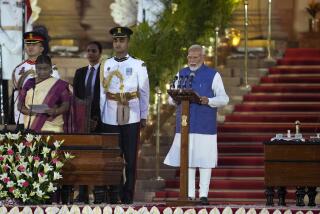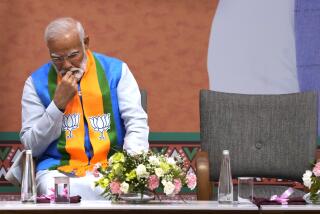India Prime Minister Resigns Amid Jeers
- Share via
NEW DELHI — Assailed by hoots and jeers during an uproarious session of Parliament, Prime Minister Atal Behari Vajpayee abruptly resigned Tuesday, ending the most short-lived government in independent India’s history.
The world’s most populous democratic republic headed next for a center-left coalition government of still-murky policies and personalities, chaired by H. D. Deve Gowda, the son of a middle-class farming family from southern India.
The formerly ruling Congress (I) Party has already pledged support for the 14-party “United Front” coalition, with one condition being continuation of the market-driven economic reforms that Congress launched in 1991 and that have sparked keen interest among investors in the United States and other Western countries.
Inside India’s British-built Parliament building, the 13-day-old Hindu nationalist government ended not with a last-ditch battle but an abdication.
Vajpayee, 69, bitterly accused opponents of his Bharatiya Janata Party of forging an opportunistic alliance to drive it--the largest party in Parliament--from power.
The BJP’s enemies said they united to preserve India’s tradition of keeping a firewall between religious matters and politics. “In the nation’s body, your growth is called cancer, and the nation must be rid of it,” one anti-BJP member of Parliament told Vajpayee.
The BJP, though the top vote-getter in India’s recent general election, was able to muster only 194 votes, including those of four small allied parties, in the 545-seat Lok Sabha, or lower house.
Vajpayee admitted he failed but said it was because of the BJP’s refusal to engage in “horse trading” with other parties. “We did not use suitcases to convert our minority into a majority,” Vajpayee declared, alluding to accusations that his Congress predecessor had doled out payoffs to ensure his government’s survival.
Vajpayee and his 11 ministers were facing their first test in Parliament, a no-confidence vote that would have doomed their Cabinet. During a debate that began Monday, foes of the BJP objected to its platform plank calling for elimination of a special civil code allowing Indian Muslims to marry, divorce and write wills according to Islamic tradition.
Some lawmakers reminded Parliament of how Hindu extremists destroyed a mosque in the northern town of Ayodhya in December 1992, kindling riots that set the country’s majority Hindu community against the Muslims.
Before a vote could be taken on the no-confidence motion, Vajpayee said he would resign, throwing the Lok Sabha into an uproar.
President Shankar Dayal Sharma asked Vajpayee to remain in a caretaker role and called upon Gowda, 63, chief minister of the state of Karnataka, to head the next government and prove his majority by June 12.
Though back-to-back, center-left coalitions in 1989-91 proved notoriously unstable, Gowda, of the Janata Dal Party, will probably be welcomed by many overseas investors.
Karnataka, where he has served as the top elected official since Dec. 11, 1994, has been in the forefront of courting foreign capital and businesses, including many high-technology firms from the United States. Its capital, Bangalore, is India’s center for computers, data processing and other cutting-edge industries.
But it is anyone’s guess how a coalition of more than a dozen parties jockeying for jobs and policy input will work. Gowda was drafted as a consensus choice for the premiership after two others, including former Prime Minister V. P. Singh, could not be enlisted.
What’s more, since the front can muster only 177 votes in the Lok Sabha, less than the BJP, the support of Congress, which has 136 seats, will be vital. History offers an inauspicious precedent: In 1991, Congress pulled the rug out from under the center-left coalition led by Prime Minister Chandra Shekhar by withdrawing its backing.
Congress has said it will support Gowda “from the outside”--without taking ministerial portfolios for itself. But even coordination of parliamentary votes by the two blocs will make for strange bedfellows. Many of the leftist, socialist or lower-caste members of the United Front, including Gowda’s party, campaigned vigorously against Congress’ “anti-poor” economic reforms and its alleged corruption.
More to Read
Sign up for Essential California
The most important California stories and recommendations in your inbox every morning.
You may occasionally receive promotional content from the Los Angeles Times.










